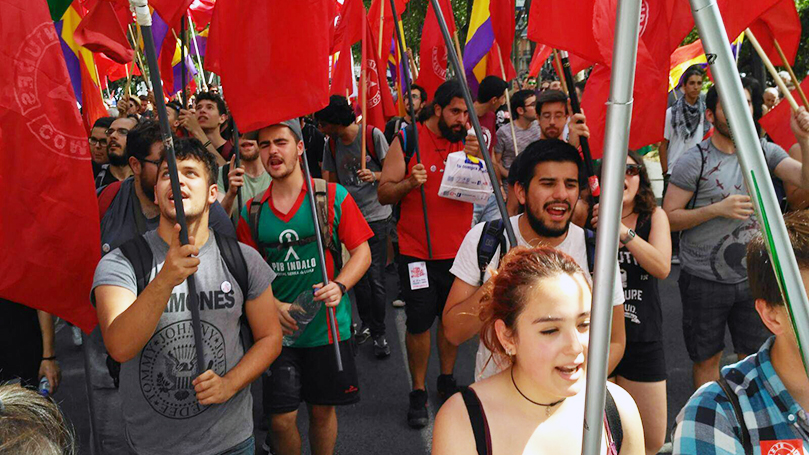
Spanish Communists call for negotiated settlement of Catalan issue
Claiming that the poisonous relations between the central government in Madrid and the Generalitat, the autonomous Catalan government in Barcelona has become a dangerous “dialogue of the deaf”, the Communist Party of Spain is reiterating its criticisms of both Spanish Prime Minister Mariano Rajoy and Catalan President Carles Puigdemont for bringing matters to this point.
“At this moment the Communist Party of Spain (PCE) believes that that we progressive and left-wing forces have the obligation to put forward and fight for a solution to the present situation that will benefit the working class people’s strata of Catalonia and the rest of Spain, and, we think that we must push for [both Rajoy and Puigdemont] face reality.” This would mean that Puigdemont should recognize that although the October 1 vote was an important mobilization that was wrongly repressed by Rajoy, but that this can’t be used for a unilateral declaration of independence as Puigdemont has been threatening.
Rajoy should also abandon the policy of repression, stop arresting social movement leaders in Catalonia, and recognize the rights of Spain’s multiple peoples to determine their own future. Neither the October 1 vote nor the threat by the Madrid to revoke Catalonia’s existing autonomy by invoking the drastic Article 155 of the Spanish constitution of 1978.
Iran: Tudeh accuses Trump of raising tensions
In a Central Committee statement, the Tudeh Party of Iran, which is the country’s communist party, has sharply criticized U.S. President Donald Trump for his recent threats to put an end to the Joint Comprehensive Plan of Action, the agreement among Iran, the United States, China, Russia, France, Britain and Germany, which has stopped Iranian activities that could lead that country to developing nuclear weapons. Calling Trump’s policy “reactionary and unilateralist”, the Tudeh Party warns that this, as well as the U.S. withdrawal from UNESCO, is part and parcel of a U.S. alliance with Israel and Saudi Arabia to dominate the Middle East. Tudeh scoffed at Trump’s expressions of sympathy for the Iranian people under the authoritarian theocratic regime in Tehran as “fake” and pointed out that U.S. sanctions and other anti-Iran policies chiefly hurt ordinary Iranians.
At the same time, the Tudeh statement warned Iranian leaders against provocative actions and statements that could play into the hands of Trump and increase the war danger.
SACP denounces removal of Nzimande from Zuma’s cabinet
The South African Communist Party (SACP) has reacted with disgust to the removal of its Secretary General, Blade Nzimande, from his government position as Minister of Higher Education and Training. The Party calls the removal of Nzimande a “factional” move by the country’s president, Jacob Zuma, rather than a routine cabinet reshuffle, and warned that this sort of thing could hurt the Tripartite Alliance of the Communist Party, the Congress of South African Trade Unions (COSATU) and the African National Congress (ANC). “The continued authoritarianism by Zuma, disregarding alliance protocols and relations, has plunged the Alliance into uncharted waters.” The SACP statement points out that the three alliance partners are supposed to consult on cabinet appointments.
The South African Communist Party has been calling for Zuma’s resignation because “the malady of corruption, governance decay and state capture” has got sharply worse during Zuma’s presidency. The Communist Party thinks that the removal of Nzimande from Zuma’s cabinet is retaliation for that criticism.
Brazil: Communists blast move to weaken anti-slavery laws
The Communist Party of Brazil (Partido Comunista do Brasil, PC do B), one of two communist parties in that country, has sounded the alarm about moves by the right-wing government of President Michel Temer to weaken the country’s laws forbidding slavery.
In an October 19 statement, the PC do B denounced the recent move by Brazil’s Ministry of Labor and Employment to modify the definition of what constitutes slavery. The communists see this change as making it harder to combat and prosecute this type of violation of rights, and a violation of international treaties against slavery of which Brazil is a signatory. According to the PC do B statement, one of the most dangerous moves by the government is to give the minister of labor the sole right to include a company on the “dirty list”. The communists fear that this could politicize the listing, or non-listing, of such companies. The government’s proposal also weakens the actions that companies must undertake to get off the list, such as compensating the victims of exploitation akin to slavery.
The current Brazilian government is heavily reliant on the support of big landowners for its existence, and these are the very people likely to be sanctioned under the former rules.



 Join Now
Join Now